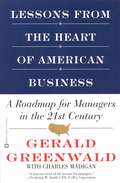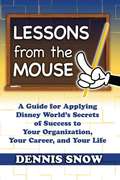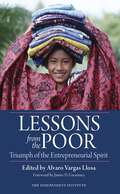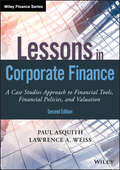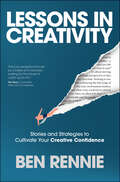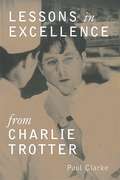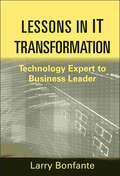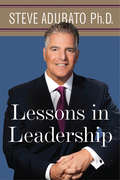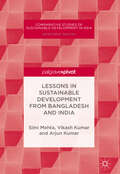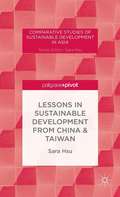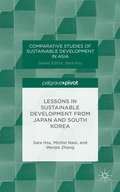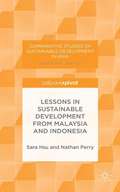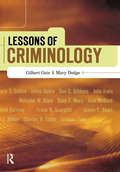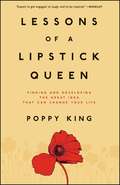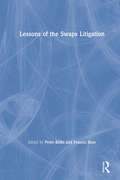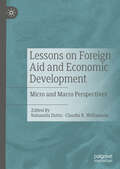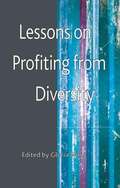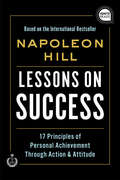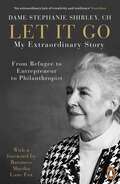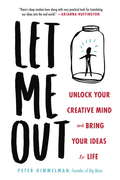- Table View
- List View
Lessons from the Heart of American Business: A Roadmap for Managers in the 21st Century
by Charles Madigan Gerald GreenwaldOne of America's most respected executives offers management insight into how to do business now and into the next century. Since taking over as chairman and chief executive officer of United Airlines, Gerald Greenwald has seen operating margins and productivity go up, labor grievances go down, and the stock price more than double. In LESSONS FROM THE HEART OF AMERICAN BUSINESS, Greenwald shares his extraordinary experiences and insight into how businesses in America operate today, including: corporate ethics, dealing with layoffs, building trust, office politics, and much more. In addition, Greenwald explores business practices and behavior in the second half of the 20th century and the important lessons they can teach about managing in the future.
Lessons from the Mouse: A Guide for Applying Disney World's Secrets of Success to Your Organization, Your Career, and Your Life
by Dennis SnowWhat can you learn from a mouse? When that mouse has been delighting and entertaining hundreds of millions of people for decades - it turns out there is plenty to learn. Dennis Snow's Lessons From the Mouse provides ten no-nonsense, practical principles that anyone, anywhere can apply. He entertains while he educates with chapters like 'What Time is the 3:00 Parade?' Is Not a Stupid Question. The mouse is very candid here - no Disney pixie dust blinds the reader. Backstage snafus, onstage errors, and occasional chaos emerge in all their drama, humor, or irony. At its heart, though, Lessons From the Mouse presents ten lessons that guide readers in applying excellence in their own organizations, careers, and lives. Whether being used as a tool for increased organizational effectiveness or a pocket guide for the college grad or new entrepreneur, Lessons From the Mouse offers timeless, straightforward advice.
Lessons from the Poor: Triumph of the Entrepreneurial Spirit
by James D. Gwartney Alvaro Vargas LlosaAn important contribution to the literature of economic development, this book presents case studies of productive entrepreneurship in contemporary Africa and Latin America. It looks at the growth of Kenya's chain stores and one-person kiosks, the rise of barter clubs in Argentina, and Nigeria's clothing-design industry to illustrate economists' insights about entrepreneurship and the role that government regulations often play in impeding economic development.Half the people in the world live on two dollars or less per day and roughly 600 million live on no more than one dollar per day. With thousands of international relief organizations, strategic government programs, and billions of dollars in foreign aid, why do so many underdeveloped countries remain unable to grow their economies beyond mere survival? It is this issue that internationally acclaimed political analyst Alvaro Vargas Llosa and a select group of economists examine in a series of case studies from around the world. These studies reveal that entrepreneurial energy can be a persistent catalyst for change. But unfortunately in societies dominated by political corruption and unnecessary regulation, men and women seeking to innovate must hurdle a series of challenges. Wealth transfer, favoritism, excessive taxation, and lack of institutional security all conspire against progress. Our contributors examine real world examples of entrepreneurship and argue that instead of redistributing existing wealth, developing countries should start working to create it.
Lessons in Corporate Finance: A Case Studies Approach to Financial Tools, Financial Policies, and Valuation (Wiley Finance)
by Paul Asquith Lawrence A. WeissAn intuitive introduction to fundamental corporate finance concepts and methods Lessons in Corporate Finance, Second Edition offers a comprehensive introduction to the subject, using a unique interactive question and answer-based approach. Asking a series of increasingly difficult questions, this text provides both conceptual insight and specific numerical examples. Detailed case studies encourage class discussion and provide real-world context for financial concepts. The book provides a thorough coverage of corporate finance including ratio and pro forma analysis, capital structure theory, investment and financial policy decisions, and valuation and cash flows provides a solid foundational knowledge of essential topics. This revised and updated second edition includes new coverage of the U.S. Tax Cuts and Jobs Act of 2017 and its implications for corporate finance valuation. Written by acclaimed professors from MIT and Tufts University, this innovative text integrates academic research with practical application to provide an in-depth learning experience. Chapter summaries and appendices increase student comprehension. Material is presented from the perspective of real-world chief financial officers making decisions about how firms obtain and allocate capital, including how to: Manage cash flow and make good investment and financing decisions Understand the five essential valuation methods and their sub-families Execute leveraged buyouts, private equity financing, and mergers and acquisitions Apply basic corporate finance tools, techniques, and policies Lessons in Corporate Finance, Second Edition provides an accessible and engaging introduction to the basic methods and principles of corporate finance. From determining a firm’s financial health to valuation nuances, this text provides the essential groundwork for independent investigation and advanced study.
Lessons in Creativity: Stories and Strategies to Cultivate Your Creative Confidence
by Ben RennieHow do our everyday choices infuse our lives with purpose? What happens to the things we create, and how do they impact others? How does innovation influence our lives, our communities and the spaces we share? Lessons in Creativity is a powerful exploration of what it means to be creative, offering readers a blend of personal stories, unexpected insights and inspirational takeaways. Australian designer Ben Rennie takes readers on a journey from working with world-leading brands, including Chanel, Luxottica and Gore-Tex, to the everyday moments that shape the imagination. In this book, you'll follow Ben as he explores the tangible, personal power of creative confidence. We often underestimate the potential of our own creativity, believing it belongs to artists, writers or performers. But creativity is inherently human — it's about showing up with generosity and curiosity. Whether you're an accountant, a politician, a full-time parent or an engineer, creativity brings exciting thinking and purpose to life. As the foundation of our work, relationships and lives, creativity brings meaning and fulfilment to everything we do. Lessons in Creativity reaffirms our role as the architect of our destiny, with the ability to form new habits, craft fresh stories and unlock unseen horizons. It reveals a philosophy for aligning your daily actions with your deepest aspirations and values, using your creative confidence as the engine for transformation. The creative journey is a winding road marked by persistence and self-awareness. Creativity is not something we have or we don't; we learn and develop it through practice. In adopting this mindset, we open ourselves to a world of possibility, where each decision brings us closer to realising a potential. In this sense, creative problem-solving is not a gift but a skill. If you're feeling stuck or disconnected, Lessons in Creativity will inspire you to show up, take that first step and re-engage your creative potential.
Lessons in Excellence from Charlie Trotter (Lessons from Charlie Trotter)
by Paul Clarke Geoffrey SmartCharlie Trotter's Chicago restaurant is not only one of the premiere eating experiences in America, it serves also as the model of a thriving business whose cutting-edge approach to management is setting new standards for quality, efficiency, and profitability. In fact, people in just about any field can learn from Charlie's methods. For this breakthrough business guide, journalist Paul Clarke conducted in-depth interviews with Charlie and his associates, distilling invaluable lessons for entrepreneurs and hospitality professionals who are committed to creating highly respected and innovative businesses. Anyone who wants to improve their business will be sure to learn something new from this Midwestern dynamo.From the Hardcover edition.
Lessons in IT Transformation
by Larry BonfanteImportant insights into the true purpose of IT?from a CIO's perspectiveFocusing on the qualities required to transform an organization through the lens of the CIO, this book provides practical advice on how to address key issues, as well as create a context for the type of leadership qualities required to broaden the CIO's impact in every aspect of the corporation. Provides practical advice on key issues for leadership qualitiesLooks at the differences between leadership and management and the need for effectiveness in both disciplinesExplores relationship management, communication skills, change management, developing human capital, sustainability, alignment, and qualities of great leadersA timely look at how the IT function can become totally aligned with the strategies and operational direction of the business enterprise, Lessons in IT Transformation reveals how CIOs can?and should?evolve from managers of utility services to business leaders who can drive revenue, value, and process redesign.
Lessons in Leadership
by Steve AdubatoIn this practical guide, Emmy Award-winning public broadcasting anchor Steve Adubato teaches readers to be self-aware, empathetic, and more effective leaders at work and at home. His powerful case studies spotlighting dozens of leaders--from Pope Francis to New Jersey governor Chris Christie--are complemented by concrete tips and tools based in real-life scenarios. With Lessons in Leadership, readers can learn to steer others through difficult economic times, to mentor rising leaders, to provide straight talk to underperforming employees, and even how to lead a company through a significant change.
Lessons in Sustainable Development from Bangladesh and India (Comparative Studies Of Sustainable Development In Asia Series)
by Simi Mehta Vikash Kumar Arjun KumarThis Palgrave Pivot looks through social, economic, institutional, and environmental lenses to examine sustainable development in India and Bangladesh. The effects of climate change make this comparative study particularly pertinent, as rising sea levels and severe weather events will lead to displacement and migration, exacerbating existing issues. India and Bangladesh share similar cultural and socioeconomic backgrounds and, as a result, face similar challenges: rapid population growth, widespread poverty, food insecurity, and gender inequality. Developing a sustainable future will require policymakers to consider all of these elements in their efforts to create human security.
Lessons in Sustainable Development from China & Taiwan
by Sara HsuIn Lessons in Sustainable Development, Hsu examines China and Taiwan in terms of inequality and environmental issues.
Lessons in Sustainable Development from Japan and South Korea
by Sara Hsu Michio Naoi Wenjie ZhangSustainable Development in Japan and South Korea compares the two countries, makes policy recommendations, and examines sustainable development experiments from both nations.
Lessons in Sustainable Development from Malaysia and Indonesia
by Sara Hsu Nathan PerryHsu and Perry provide a concise overview of sustainable development in the nations, make policy recommendations for each country, and discuss sustainable development experiments in both countries.
Lessons in the Service Sector
by James L. HeskettThe Hartford Steam Boiler Inspection and Insurance Co. (HSB) dominates the market segment in which it operates. Its success comes largely from the company's service delivery system, a joint product of HSB's marketing and operating managers. Vital to strategy implementation is involving the employees who deliver the service. Successful companies focus on shared values, control by peer groups, generous incentives, and--where possible--a close relationship with the customer. Using databases imaginatively permits many of these businesses to substitute information for assets that both enhance service effectiveness to existing customers and attract new ones.
Lessons of Criminology
by Mary Dodge Gilbert GeisPresents the stories, musings, advice and conclusions of well-known criminologists about their research and their careers. Provides readers with suggestions about how to manage their professional lives. Contributors include Frank Cullen, Julius Debro, Don Gibbons, John Irwin, Mac Klein, Gary Marx, Joan McCord, Richard Quinney, Frank Scarpitti, Jim Short, Rita Simon, Charles Tuttle and Jackson Toby.
Lessons of a Lipstick Queen
by Poppy KingFrom the perfect lip stick to mergers and acquisitions, Lessons of a Lipstick Queen follows Popy King's extraordinary journey through the world of business and teaches you how to be more entrepreneurial in your own life. If an eighteen-year-old girl's search for the ideal matte lipstick can turn into a multimillion-dollar company, anything is possible. When Poppy King finished high school, all she had to show for herself were some lackluster grades and a hundred and one ways to get out of phys ed. Within three years, however, she was president of her own hugely successful lipstick brand, Poppy Industries. How did she do it? In Lessons of a Lipstick Queen, Poppy reveals how she managed to launch her business, extracting valuable lessons from the experience as she goes along. Through Poppy's example, you can learn how to become a real entrepreneur -- from recognizing a good idea and finding financing, to marketing yourself and your brand, to approaching the media and avoiding common pitfalls. Whether you are looking to go into business for the first time, or simply want to build on your current career, Poppy King is the voice of experience that you should be listening to. In a world where everyone is eager to get ahead, it's essential to think like an entrepreneur. Much more than just a guide to success, Lessons of a Lipstick Queen is a candid adventure story designed to take you on a journey of self-discovery. Filled with exercises, concrete tips, and Poppy's personal and professional anecdotes, this motivational book will help readers get in touch with their inner entrepreneur.
Lessons of the Swaps Litigation
by Peter Birks and Francis RoseThis is the first comprehensive review of the extent of remedies and impact of contractual agreements on restitution claims for void, unenforceable, and discharged contracts.
Lessons on Foreign Aid and Economic Development: Micro and Macro Perspectives
by Nabamita Dutta Claudia R. WilliamsonA response to the pressing need to address and clarify the substantial ambiguity within current literature, this edited volume aims to deepen readers’ understanding of the impact of foreign aid on development outcomes based on the latest findings in research over the past decade. Foreign aid has long been seen as one of two extremes: either beneficial or damaging, a blessing or a curse. Consequently, many readers perceive aid’s effectiveness based on the work of scholars who are assessing the impact of aid from one of two antithetical perspectives. This book takes a different approach, shedding light on recent research that can deepen our understanding of the complex relationship between aid and its aftereffects. Drawing from an extensive set of studies that have explored micro and macro impacts of foreign aid for recipient nations, chapter authors highlight more layered and nuanced findings, with a focus on donor characteristics, political motives, and an evaluation of aid projects and their effectiveness, including the differential impact based on type of aid. This volume is the first of its kind to unpack aid as a complex rather than a unitary concept and explore the wide areas of grey that have long enshrouded foreign aid.
Lessons on Profiting from Diversity
by Gloria MossShows the strong business case for diversity and the deleterious effects of not allowing diversity to take root in organizations by providing afascinating insight into the case for gender diversity in the professional services, marketing and digital arenas, and the way in which a diversity mindset can be fostered in organizations. "
Lessons on Success: 17 Principles of Personal Achievement - Through Action & Attitude (Ignite Reads)
by Napoleon HillFrom the bestselling author Napoleon Hill—Lessons on Success has helped millions of readers make the impossible, POSSIBLE!Napoleon Hill's 17 Essential Principles of Personal Achievement have served as an encouraging and illuminating guide for those seeking to improve all areas of their lives for more than half a century.Lessons on Success is the book that keys readers into Hill's distinct thought process—this is THE complete and unabridged mind-power method for achieving your goals.After interviewing dozens of industrialists, diplomats, thought leaders, and people who are at the top of their game, Hill distilled what he learned and converted his study into seventeen core lessons that will set you up for success in every facet of your life!
Let It Go: My Extraordinary Story - From Refugee to Entrepreneur to Philanthropist
by Richard Askwith Dame Stephanie Shirley CHA moving memoir from a woman who made a fortune in a man's world and then gave it all away...soon to be turned into a filmIn 1962, Stephanie 'Steve' Shirley created a software company when the concept of software barely existed. Freelance Programmers employed women to work on complex projects such as Concorde's black box recorder from the comfort of their own home. Shirley empowered a generation of women in technology, giving them unheard of freedom to choose their own hours and manage their own workloads. The business thrived and Shirley gradually transferred ownership to her staff, creating 70 millionaires in the process.Let It Go explores Shirley's trail blazing career as an entrepreneur but it also charts her incredible personal story - her dramatic arrival in England as an unaccompanied Kindertransport refugee during World War Two and the tragic loss of her only child who suffered severely from Autism.Today, Dame Stephanie Shirley is one of Britain's leading philanthropists, devoting most of her time, energy and wealth to charities that are close to her heart. In Let It Go, Shirley tells her inspirational story and explains why giving her wealth away - letting it go - has brought her infinitely more happiness and fulfilment than acquiring it in the first place.Co-written with Richard Askwith, the former Executive Editor of The Independent and the award-winning author of seven books in his own name, including biographies of Emil Zátopek and Lata Brandisová.'An extraordinary tale of creativity and resilience' - Guardian'This engrossing story of an extraordinary life is filled with lessons in what it means to be human' - Financial Times
Let It Settle Journal: Guided Prompts and Practices to Move You From Chaos to Calm
by Michael GalyonAn essential companion to Let It Settle and a roadmap to many of life's most difficult moments In the Let It Settle Journal: Guided Prompts and Practices to Move You From Chaos to Calm Journal, a transformative companion to Michael Galyon's acclaimed Let It Settle: Daily Habits to Move You From Chaos to Calm, you'll find a resource that serves as a personal sanctuary for reflection and growth, offering guidance through the tumultuous moments of life. Michael Galyon, renowned for his insightful approach to finding peace and control, provides a calming Journal for those navigating life's challenges. Let It Settle Journal is thoughtfully designed to align with the impactful lessons of its companion book. It addresses significant life events such as the loss of a loved one or the end of a relationship, each of which can lead to troubling emotions. The journal guides readers through mindfulness-based practices and targeted meditations for these specific experiences, fostering a sense of calm and understanding. You'll also find: Structured sections focusing on various life challenges and the accompanying emotional responses Meditations tailored to specific life experiences, offering a path to peace and clarity Experiential learning that encourages embodying the concepts of "Let It Settle" in a safe, guided manner Let It Settle Journal is more than just a journal; it's a companion for life's journey, providing a beacon of calm and a roadmap for healing. Whether you're grappling with major life changes or seeking to maintain equilibrium in a chaotic world, this journal is an essential tool for personal growth and emotional resilience. It's a perfect choice for anyone looking to deepen their understanding and application of the principles from Let It Settle.
Let It Settle: Daily Habits to Move You From Chaos to Calm
by Michael GalyonA safe place of calm, reflection, and healing as you navigate through life's challenges and find your way home to yourself. In Let It Settle, veteran professional coach and mindfulness leader Michael Galyon delivers a calm space you can call upon when faced with moments of unrest and overwhelm. The book offers insights into your experiences and emotions that confirm you do not face life alone and provides you with tools and guided meditations you can use to navigate through your experiences to a centered space from which healing is possible. In the book, you'll find a series of consequential moments that commonly induce stress, worry, overwhelm, anxiety, and fear. Each section highlights a step on the path from unsettled to settled—like finding calm, coming home to yourself, and honoring connection—and walks you through the mindfulness-based tools, daily habits, and guided meditations that will help move you through life's most challenging moments and take you from chaos to calm. You'll also find: Experiential learning techniques that rely on proven methods you can put into daily practice A safe space you can go when the time is right for you to begin addressing the issues affecting you A source of validation that confirms the value of your emotions and experiences An effective and hands-on resource for busy professionals, academics, students, athletes, and anyone else doing their best to confront the challenges life constantly throws at us, Let It Settle is an extraordinary ally in the quest to see clearly and determine with confidence your next best step.
Let Me Out: Unlock Your Creative Mind and Bring Your Ideas to Life
by Peter HimmelmanFrom award-winning musician turned communications expert Peter Himmelman, science-based techniques and simple exercises to get unstuck and unlock your creative potential. Do you want to stop procrastinating? Would you love to be more creative? Is there an idea you've dreamt of making a reality? Whether it's learning ragtime piano, losing 30 pounds, or starting an organic jellybean company, Himmelman's unique, inspiring methods will give you the tools and confidence you need to harness your fear and take steps to make your goals a reality. Using practices mined from his years as a successful musician, Himmelman shows you how to open your mind and unite left AND right-brained thinking through powerful and deceptively easy exercises that will enable you to:-Create more fearlessly, whether it's an ad campaign, a song, or a new business -Communicate more effectively -Finish projects that have stayed in the "bits and pieces" phase forever -Make your ideas take shape in the real world The perfect tool for anyone in a mental rut, Let Me Out will force you to stop listening to the negative thoughts that hold you back and achieve the professional and personal success you deserve.From the Hardcover edition.
Let Me Stop You Right There: And 28 Other Lines Every CEO, Manager, and Supervisor Should Know
by Pamela D. StrakerHave you ever noticed that great CEOs, managers and other people in charge always seem to know exactly what to say in every situation? Author Pamela Straker, with more than 25 years experience as a mental health and management professional, has. And in Let Me Stop You Right There, she outlines various common scenarios for effective communication with office archetypes: &“by-any-means-necessary&” overachievers, gossips, office invaders, negativity-mongering complainers, and many more. Chapter-by-chapter, Straker addresses effective means of communication in the workplace with great humor and insight. Each chapter outlines a scenario, proposes the response, or &“line,&” to bring the discussion to its logical conclusion, and provides an explanation of why these lines work. Whether a CEO, manager, or supervisor, Let Me Stop You Right There is sure to become an indispensable addition to your business library.
Let My People Go Surfing
by Yvon ChouinardIn his long-awaited memoir, Yvon Chouinard-legendary climber, businessman, environmentalist, and founder of Patagonia, Inc. -shares the persistence and courage that have gone into being head of one of the most respected and environmentally responsible companies on earth. From his youth as the son of a French Canadian blacksmith to the thrilling, ambitious climbing expeditions that inspired his innovative designs for the sport's equipment, Let My People Go Surfing is the story of a man who brought doing good and having grand adventures into the heart of his business life-a book that will deeply affect entrepreneurs and outdoor enthusiasts alike. .
